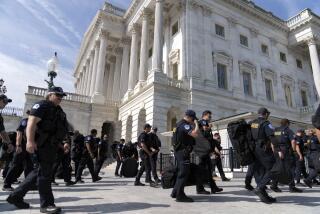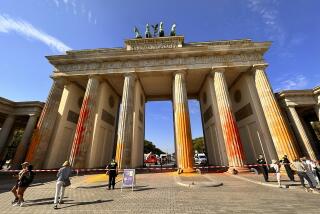Tear Down Berlin Wall, Reagan Asks : Challenge Issued to Soviet Leader in Divided City
WEST BERLIN — President Reagan, declaring in German that “there is only one Berlin,” stood Friday before the Brandenburg Gate, the symbol of this divided city, and challenged Soviet leader Mikhail S. Gorbachev to tear down the Berlin Wall.
“General Secretary Gorbachev, if you seek peace, if you seek prosperity for the Soviet Union and Eastern Europe, if you seek liberalization: Come here, to this gate,” Reagan said. “Mr. Gorbachev, open this gate. Mr. Gorbachev, tear down this wall.”
“This wall will fall,” Reagan declared in the speech, carried by loudspeakers to several hundred East Berliners trying to listen from beyond the gate. “For it cannot withstand faith. It cannot withstand truth. The wall cannot withstand freedom.”
Crowd of 20,000
Before the speech, designed to put a sharp East-West focus on the President’s nine-day European trip, the White House engaged in a drawn-out confrontation with West German authorities, who sought a less provocative background for the President than the gate. Indeed, the Germans sought to hold the crowd to 20,000 though the Americans wanted 40,000.
In any case, by the time Reagan spoke on the cloudy afternoon, the crowd appeared to barely reach 20,000 on the Strasse des 17 Juni--June 17th Street--which commemorates a 1953 anti-Soviet uprising in East Berlin.
The Bonn government was concerned that tough rhetoric by Reagan, paired with the symbolism of the towering gate flying the black, red and yellow flag of East Germany, would upset the tentative efforts by East and West Germany to move toward increased contacts. But, argued a White House official, “This is not Red-bashing. The gate is a metaphor for openness and commerce.” Traffic once passed freely beneath the gate.
East-West Symbolism
As it has for each President since John F. Kennedy, the divided city 110 miles inside East Germany has symbolized the rough edges of East-West relations, and about 14,000 U.S. troops are deployed here in a tangible display of the West’s commitment to the city. Since the end of World War II, Berlin has come under the jurisdiction of the four Allied powers: the United States, Britain, France and the Soviet Union.
Reagan came here to renew that commitment, using the occasion of Berlin’s 750th anniversary to become the first American president to visit the city twice while in office. He first visited Berlin in 1982.
At a celebration held at Tempelhof Airport--the terminus of the Berlin Airlift of 1948 that flew crucial supplies to the city when it was blockaded by the Soviets--Reagan declared:
“Our troops will remain here as long as they are wanted and needed by Berliners to demonstrate to the other side that force and coercion cannot succeed.”
Pressure for Openness
The President arrived in Berlin at a time when East German authorities and others in the Soviet Bloc are faced with growing pressure to follow the course set by Gorbachev--that of glasnost (openness) . Earlier, outdoor rock concerts staged in the West drew thousands of young East Berliners to the streets near the wall, and they sent up the chant “Gorbachev! Gorbachev!” in an unusual display of support for the policies of the Soviet leader.
Riot police here outmaneuvered bands of anti-Reagan protesters Friday, arresting 350 people who tried to defy a demonstration ban imposed during the President’s visit and tossed rocks at police officers. Despite the arrests, a Berlin police spokesman told United Press International that there were no serious incidents during the 4 1/2 hours Reagan was in West Berlin.
On Thursday, the day before Reagan arrived, an estimated 24,000 people had marched to a rally opposing such U.S. policies as those in the Persian Gulf and Central America, and hundreds smashed windows, looted stores and battled with police.
Police Mobilized
In an impromptu remark, Reagan referred to these demonstrators, saying, “I wonder if they have ever asked themselves that if they should have the kind of government they apparently seek, no one would ever be able to do what they’re doing again.”
About 10,000 police officers were mobilized to protect Reagan, and barricades were erected to keep any protesters at least a mile away from the speech site.
The President spoke from a platform built about 100 yards from the Brandenburg Gate, with thick protective glass behind him providing an unobstructed view--of the gate from the West, and of Reagan from the eastern sector.
The gate--actually a rectangular arch supported by six columns--was built in 1791, destroyed at the end of World War II and then reconstructed. It is situated just inside East Berlin, on the east end of the Tiergarten, a center-city zoological park near the Soviet war memorial, where one of the last battles of the war in Europe was fought.
East German Criticism
Police patrolled the East Berlin side, under the arch, and traffic could be seen on Unter den Linden, a main thoroughfare. Several hundred people could be seen gathered there, listening to Reagan’s speech, though the Associated Press reported from East Berlin that much of it was unintelligible because of poor amplification. A few carried portable radios.
Condemning the speech in advance as a provocation, East German authorities said the address “would only make the wall higher.” The official East German news agency covered the Reagan visit but stressed the elaborate security precautions and said Reagan was unrealistic to question borders that resulted from World War II.
On either side of the gate, the Berlin Wall reaches out around the western sector, forming a 103-mile continuous belt of concrete, chain link and barbed wire. Construction of the wall began Aug. 13, 1961, to halt the exodus of East Europeans to the West.
Visiting the Reichstag building, where the German Parliament met before the war, Reagan stood on a glass-enclosed balcony about 20 feet from the wall. On the other side, East German guards in a tower peered at Reagan through binoculars and cameras.
Just as Kennedy said in 1963, “Ich bin ein Berliner (I am a Berliner)” in a stirring speech to a crowd at the City Hall, Reagan sought to establish his own credibility as a defender of Berlin.
“Standing before the Brandenburg Gate, every man is a German, separated from his fellow men. Every man is a Berliner, forced to look upon a scar,” Reagan declared.
“I join you as I join your fellow countrymen in the West in this firm, this unalterable belief: “Es gibt nur ein Berlin (There is only one Berlin),” Reagan said, bringing cheers from the crowd at the gate.
He added: “Ich hab ‘ noch einen koffer in Berlin” (I still have a suitcase in Berlin),” a colloquial expression meaning, “I feel at home in Berlin.”
‘Break Down the Barriers’
“We in the West stand ready to cooperate with the East to promote true openness--to break down the barriers that separate people, to create a safer, freer world. And surely there is no better place than Berlin, the meeting place of East and West, to make a start,” Reagan said.
He said that a more open society on the eastern side of the wall could turn Berlin into an aviation hub of central Europe, bring international meetings to the city and open cultural and youth exchanges between the two Germanys.
He challenged Gorbachev to extend his liberalizing domestic policy of glasnost to Eastern Europe. “We hear much from Moscow about a new policy of reform and openness,” he said, citing the release of some political prisoners, the end of jamming of some foreign news broadcasts and the start of economic ventures relatively free of state control.
‘Beginnings of Change?’
“Are these the beginnings of profound change in the Soviet state?” Reagan asked. “Or are they token gestures, intended to raise false hopes in the West or to strengthen the Soviet system without changing it?”
After the speech and the celebration at Tempelhof, Reagan flew to Bonn, conferred briefly with West German Chancellor Helmut Kohl, then headed back to Washington, arriving late Friday.
More to Read
Get the L.A. Times Politics newsletter
Deeply reported insights into legislation, politics and policy from Sacramento, Washington and beyond. In your inbox three times per week.
You may occasionally receive promotional content from the Los Angeles Times.










